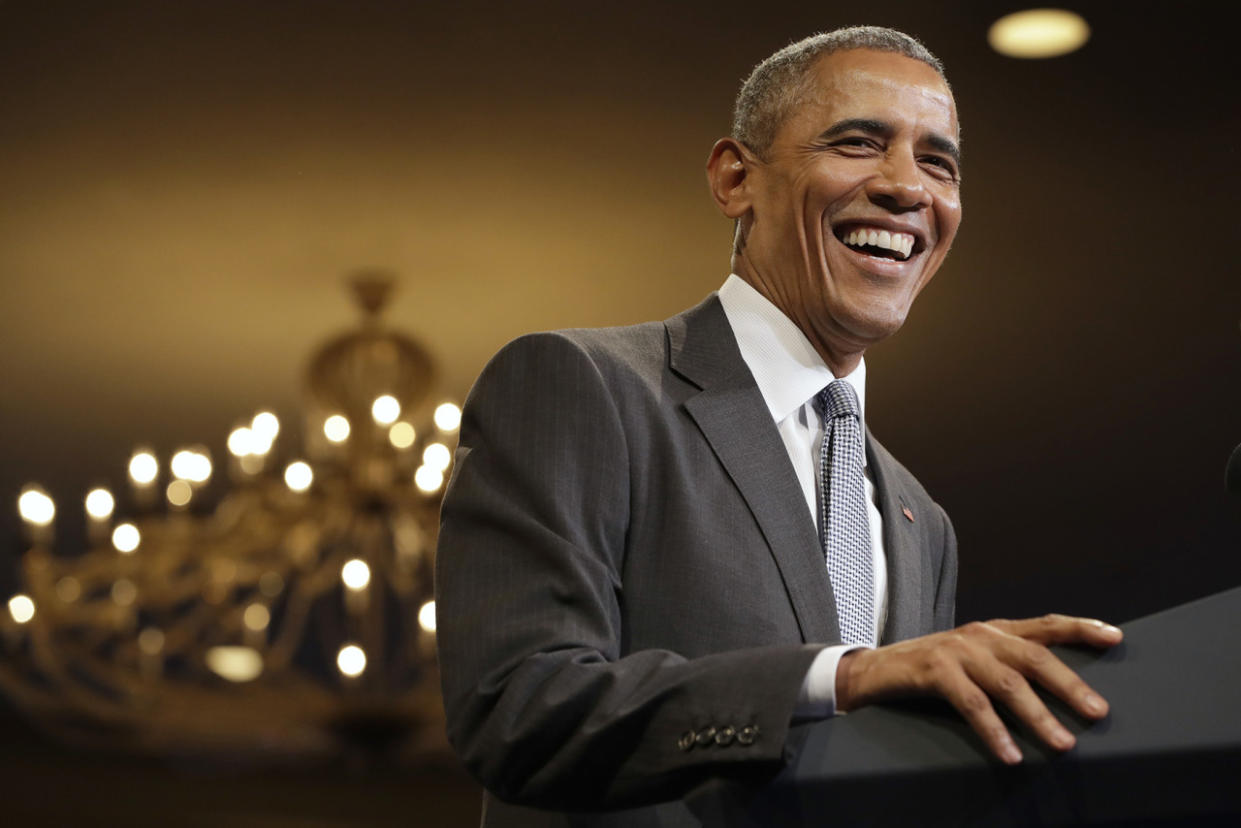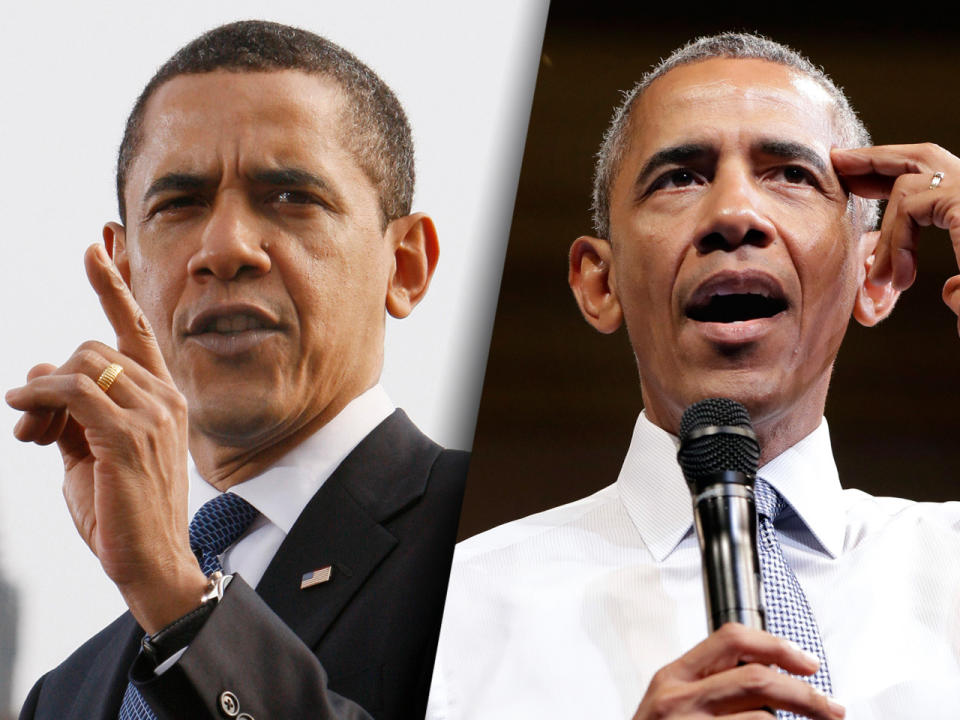Obama’s Last 100 Days: The ‘Happy Birthday, Mr. President’ edition

Ever since Franklin Delano Roosevelt, presidents have been judged on the successes they notch during their first 100 days. Now, as Barack Obama prepares to end his star turn on the political stage, Yahoo News is launching “The Last 100 Days,” a look at what Obama achieved during his consequential presidency, how he navigates the last struggles of eight years filled with firsts, and what lies ahead for him beyond the gates of the White House in late January. It will also consider how the country bids farewell to its first African-American president.
It won’t all be about policy. As Obama himself is fond of noting, he also spent his two terms as father to daughters Malia and Sasha and husband to first lady Michelle Obama. And the cultural landscape shifted dramatically on issues like gay rights, often with little prodding from the White House.
And then there’s the way the president sees the presidency — not just his own tumultuous years at 1600 Pennsylvania Avenue but also the institution and its relationships (or lack thereof) with other branches of government and the news media.
We’re launching this column today, on Obama’s 55th birthday.
Slideshow: 44th president turns 55: Photos of Obama throughout the years >>>
But one day earlier, he gave a gift of sorts to people interested in these issues during a wide-ranging town hall-style question-and-answer session with young African leaders.
It was far from a robust cross-examination. One questioner began by telling Obama, “You are definitely a visionary.” There were chants of his 2008 campaign slogan, “Yes, we can.” They sang “Happy Birthday” (a day early). People cheered the prospect of presidential handshakes, though he disappointed them by saying there would be no selfies.
But the friendly setting seemed to free Obama to publicly ponder his stunning rise in politics, his family life, the way reporters cover him, the tension between human rights and national security, and lobster ice cream.
Here are some excerpts.
– Obama riffed on the way his speech to the 2004 Democratic national convention catapulted him into national politics.
“The fact the John Kerry picked me to speak was sort of accidental, and I gave a pretty good speech…
So the day after the speech my name’s everywhere, and I’m on television. And people are saying, ‘Wow, who’s this guy Obama? You know, that was wonderful, you know, we’re really impressed, and he’s got a future, and maybe some day he’s going to run for president, etc.’
And I told my friend, because we’re still in Boston and we’re walking and there’s these huge crowds and everybody’s wants to shake my hand … and I said, ‘I’m no more smarter today than I was yesterday.’
You know, I didn’t suddenly magically become so much better than I was when I was just a state senator. Some of it had to do with just chance. It was luck.”
– Obama is known to want to devote his postpresidency to projects helping at-risk youth and promoting criminal justice reform. But he mentioned online courses available via the Young African Leaders Initiative (YALI) and said …
“I might, when I have a little more time, maybe teach one of those courses myself. Right now, I’m kind of busy.”
– Obama talked about what YALI participants had experienced in the United States.
“So you’ve gotten a taste of America, which for some of you apparently included something called lobster ice cream, which I’ve never tasted myself but, I have to admit, sounds terrible. But that’s OK. You were very brave.”

– And he mused about the 2016 election.
“You’ve also gotten a front-row seat on the fascinating roller coaster process of American democracy, because you’re here during election season. And I hope you buckled your seat belts.”
– When one questioner declared that “in this room, we’re all brothers, and you’re one of us,” Obama had a quibble.
“I have to say that at this point, I’m probably an uncle. I wish I could say I was a brother or a cousin, but now I’ve got some gray hairs. So you’ve got to call me uncle.”
– In one revealing section, Obama took issue with critics who charge that he lets human rights concerns take a back seat when national security is in play.
“Sometimes, people view this as hypocritical. [They say:] ‘Why aren’t you always putting pressure on every country? If a country’s doing some things to its people, you should have no dealings with them at all.’
And I will tell you that that’s a luxury for people who are outside of government to be able to say that.
But when you’re inside of government, then you have to try to balance. ‘OK. I’m going to engage with this government, we’re going to talk to this government. We’ll meet with them, and we will be honest with them about our differences even as we’re working with them on some of the things that we agree on.’ And hopefully, over time, this makes a difference, it has some impact.”
Obama has at times disappointed liberals who hoped he would take a tougher line on traditional allies like Egypt or Turkey, as well as on rivals like China or Russia.
– Obama also discussed the relationship (or lack thereof) between the public and private lives of politicians.
“The truth is, we have had some very great leaders who did not always have great personal lives. And I’m not actually somebody who believes that if you go into public office, that your personal life — I mean, unless you’re committing crimes or things like that — that that is necessarily the best measure, because we’ve also had people who were wonderful fathers and great husbands who were bad leaders…
… I am positive that if I’m lucky enough to live to a ripe old age and I’m, you know, on my deathbed and I’m thinking back on my life, I won’t be remembering some speech I gave or some law I signed. I’ll be remembering holding hands with my … one of my daughters and walking them to a park. That will be the thing that is most precious for me.”
– Obama also talked about yelling at the newspaper but ultimately said a free press helps government solve problems. And he suggested, without citing evidence, that the reporters who cover him have grown “sentimental.”
“Right now I’m at the end of my presidency, so the press is kind of feeling a little sentimental. And they think, ‘Oh, he’s gotten old. Look at him, we’ve beat him up. Now, let’s focus on the new guys coming in.’
But there have been times where I thought the press was very unfair, and I’d open up the newspapers and I’d go, ‘What?’ And I’d start arguing. But there have also been times where the press investigated something, and I thought, ‘You know what, this is a problem.’”
– He also reflected on important inflection points in his political career, including the time he thought about quitting politics if he did not win his Senate race in Illinois.
“There were times where, during my political career, there were times where I thought, ‘You know what? This isn’t going all that well.’ And I remember when I ran for the United States Senate, I had already lost a race to be in Congress. I had been in the state Senate for eight years. It was putting enormous strains of my family because I was traveling a lot, and I thought to myself, ‘You know what? This is it. If I don’t win this U.S. Senate race, I’m getting out of politics. I’m going to go do something else.’”
None of these statements contains earth-shattering news, or should cause a wholesale reevaluation of Obama’s presidency. But as he heads into the final stretch of his time in office, his last 100 days, they shed a little light on the president’s thinking.
That was Obama in his own words. It’s as good a starting point as any for a column that will feature the thoughts of his political friends and foes, the reporting of other Yahoo News journalists, the diagnoses of policy experts, and the perspective of historians.


